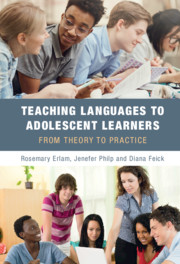Teaching Languages to Adolescent Learners
Teaching languages to adolescents can be a real struggle … but hopefully a delight! What works? What doesn’t work? This book provides a reader-friendly overview on teaching modern languages to adolescents (Years 7–13). Each chapter takes an aspect of language teaching and learning, and explains the underlying theory of instructed language acquisition and its application through examples from real language classrooms. The book explores teachers’ practices and the reasoning behind their pedagogic choices through the voices of both the teachers themselves and their students. At the same time, it highlights the needs of the adolescent language learner and makes the case that adolescence is a prime time for language learning. Written in an accessible, engaging way, yet comprehensive in its scope, this will be essential reading for language teachers wishing to integrate cutting-edge research into their teaching.
Rosemary Erlam comes from a background of teaching French to adolescents. She has worked with in-service teachers of a range of modern foreign languages, exploring with them how they might put second language acquisition theory into practice in their classrooms. She has published widely in a range of leading international journals.
Formerly a high school art and language teacher, Jenefer Philp has trained language teachers in Australia, New Zealand, Indonesia, USA, and the UK. Her publications include two books: one on peer interaction (Philp, Adams, & Iwashita, 2014), and another on language acquisition among children (Philp, Oliver, & Mackey, 2008).
Diana Feick comes from a background of teaching German as a foreign and second language. She has worked with in-service teachers of German, exploring how they use digital media in their classrooms. She has published on digital media in language teaching and learning, autonomous language learning, and language learner group interaction.

